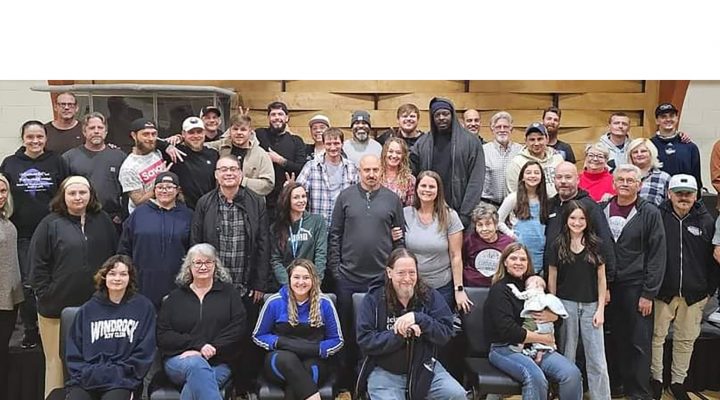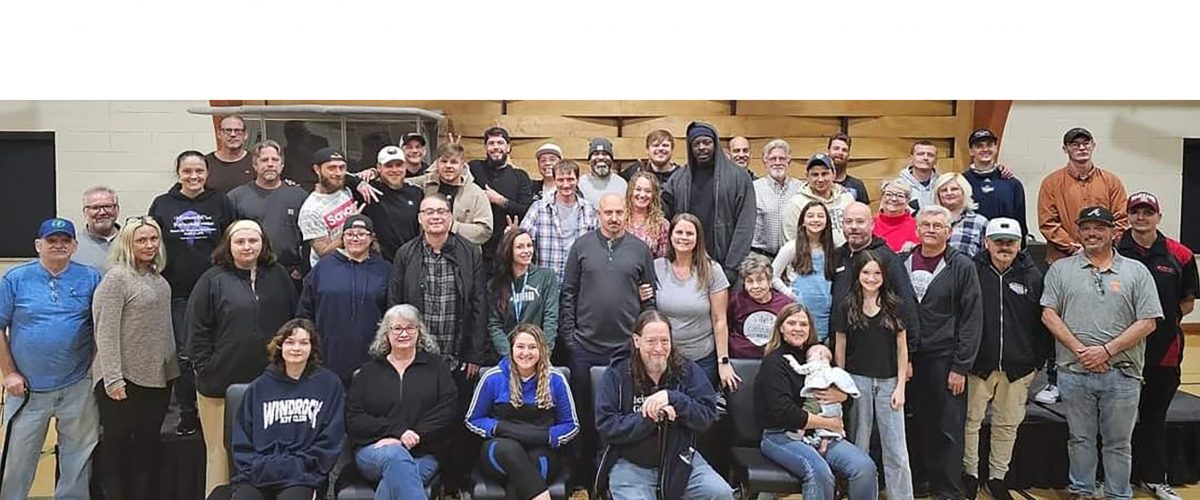While many are turning to alcohol and drugs at alarming rates, it’s time for our churches to reconsider their understanding and approach to recovery
Matthew T. DuVall serves as director of development for McAfee School of Theology at Mercer University in Georgia. He is an ordained Baptist minister in recovery who was asked to resign his role as senior pastor after revealing his alcohol use disorder nearly four years ago.
About his addiction, he says: “I was afraid to ask for help. The religion I grew up in is rooted in a moral tradition of willful control, and I knew ministers were supposed to be paragons of virtue.”

Caroline Beidler
DuVall struggled to control his drinking as he went through college, then seminary, then on to be lead pastor at a Baptist church in Georgia.
“If you know anything about addiction, you know that at the end of the day, you don’t have control or the power of will to stop it on your own,” he said.
The data
According to the recently released 2023 National Survey on Drug Use and Health, 48.5 million individuals aged 12 and older experienced a substance use disorder within the past year. This includes 28.9 million people who struggle with an alcohol use disorder. People are also dying at historic rates from substance use-related causes and overdose. For Americans ages 18 to 45, Fentanyl overdose is the leading cause of death.
Concurrently, the American church has seen a steady decline in attendance in recent decades. Twenty years ago, about 42% of U.S. adults attended church services, which has fallen to 30% today. Nearly 21% also claim no religious affiliation, compared to 9% in the early 2000s.
The stigma
Despite knowing he had a problem, DuVall did not know if there was anywhere he could turn for help. He kept hoping he could take care of the problem on his own. He also didn’t think he could tell anyone — especially because of his role in the church.
“There’s this kind of stigma that exists with a lot of ministers where we have to have everything together,” he explained.
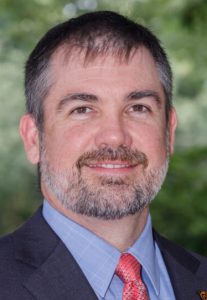
Matthew T. DuVall
DuVall is not alone. Stigma is something that impacts people seeking addiction recovery, not just those leading large congregations.
In What’s So Amazing About Grace, bestselling author and journalist Philip Yancey talks about the origins of the Alcoholics Anonymous program. Founders Bob and Bill Wilson went to visit a lawyer who had been in and out of institutions and hospital wards and was restrained to a hospital bed in leather shackles. The worn-out and combative drunk had to listen to the white-haired teetotalers. Yancey writes that the visitors shared their recovery stories with the lawyer and how they discovered God, their higher power, through the process.
As soon as they mentioned their Higher Power, Bill D. (the lawyer) shook his head sadly.
“No, no,” he said. “It’s too late for me. I still believe in God alright, but I know mighty well that he doesn’t believe in me anymore.”
“For many, struggling through addiction and other mental health challenges, grace feels far away, a chasm that can’t be bridged.”
For many, struggling through addiction and other mental health challenges, grace feels far away, a chasm that can’t be bridged. Especially in the church where historically, we are called to put on our “Sunday best” and not let the world see our brokenness or mess. Like Bill D., so many of us see a disapproving God, instead of one who loves us unconditionally.
Bridging the gap
Pastor Ed Treat, founder of the Center of Addiction and Faith, a nonprofit organization committed to sharing evidence-based information and equipping faith leaders, says it is difficult to bridge the gap between addiction stigma and the church because many people don’t understand addiction.
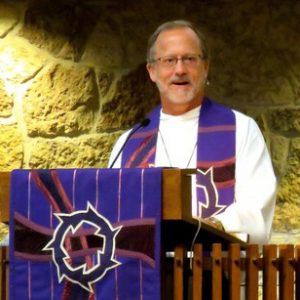
Ed Treat
“Mostly people hang on to outdated ideas about addiction even though we have a lot of good science to disprove those old ideas,” he said. “There is a lot of ignorance to overcome and the church is notoriously slow to change.”
“If we are to be followers of Christ, we are called to have compassion and understanding, but when it comes to addiction there is mostly judgment and condemnation. It’s not right. It’s not Christian.”
While broad community support for addiction recovery, including support from the church, is needed now more than ever before, pervasive stigma still prevents many people from reaching out for help and accessing the care they need. Many also still see addiction as a moral failing, not a medical condition that can be treated like cancer, diabetes or heart disease. Stigma can be especially prevalent in the church.
DuVall says a lack of education about addiction and recovery in the training of ministers for the local church left him and the network of ministers he was connected to unprepared to deal with his struggles: “Most congregations I know and have been a part of aren’t talking about this from the pulpit.”
He also agrees that stigma within religious communities prevents open conversations about addiction. He highlights that separation by saying, “When my alcohol use disorder became public knowledge, so many people from the congregation quietly came to me and said, ‘This is our family story too. … I have 17 years. … I have 30 years. … my wife…my husband…my child … my parent …my sibling.”
“What opportunities for deep connection, support and transformation had we missed because we weren’t talking about this in faith community? Why did I not know this as their pastor? It’s because none of us were talking about it due to the stigma that is perpetuated in the church.”
DuVall notes the juxtaposition of thriving for faith communities in main sanctuaries and recovery communities gathering in the basements in the “downstairs church.”
First Recovery as a model
Matt and Melinda Holder are leaders in a growing recovery ministry called First Recovery in Oak Ridge, Tenn. Their church is trying to bridge the gap between what is happening in the congregation and the recovery ministry.
“The church, as a body of believers and followers of Christ, should be a light on a hill, a soft place to land and a place filled with disciples showing those who feel like outsiders they are loved and they belong,” Melinda Holder said.
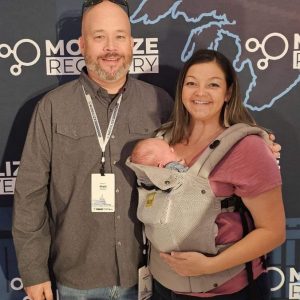
Matt and Melinda Holder
They have longtime church members who do not identify as being “in recovery” and who support the ministry. Recovery community members also volunteer with the church’s missions like their weekly community meal. Some members of First Recovery have become active members of the church. They ask the same from everyone: “Our ministry encourages the same 12-step action of service from recovery ministry participants and Sunday regulars.”
First Recovery is just one example of many recovery ministries exploring how to reduce stigma, unify the church and help those struggling with substance use and related challenges.
“We have faithfully brought these issues to light and had difficult conversations, advocated for change within our community and inside our church to bring healing, help and hope to all those who need it,” Matt Holder explained. “This is exactly what Jesus commands us to do. The results have redefined how our congregation views missions.”
First Recovery recently received a large donation from a supportive church member that will help sustain the ministry over the coming year. They are also one of the event stops for a national bus tour called Mobilize Recovery during Recovery Month. This event aims to highlight the strengths of faith-based approaches in recovery and the community coming together.
DuVall and other recovery advocates are calling for more connection between what is happening in the church and what is happening in addiction recovery circles. They are calling for greater understanding and education to reduce stigma so that more people seek the help they need. They ask for the walls between recovery and the church to come down.
Much to learn
Jon Seidl, a bestselling author and mental health advocate, is coming out with a new book centered on his experience as a Christian in recovery. He writes that while his experience has been positive among his church and faith community, “unfortunately that’s not the case for too many. The sad truth is that recovery communities and centers often look more like what the church should look like than the church does. And that’s what we need to change.”
The faith community has much to learn from the recovery community. Duvall notes that in recovery, “when we share the fulness of everything that we’ve done, and all the mistakes … in recovery, it is met with this overwhelming grace. … This radical welcome invites the fulness of who you are into community. If you don’t feel like you can bring the fullness of who you are into faith community, then we have to question whether the welcome is really reflective of the grace of God.”
He feels like recovery is exactly what the gospel is all about.
“Had I been a part of a congregation where this kind of radical grace was the bottom line … and if we had been committed to talking about it, would I have gotten help 10 years ago? 20 years ago? I don’t know. I am grateful I got it when I did.”
Faith communities must step up to help those struggling with addiction and normalize the experience that affects most American families. Sharing grace, not stigma, will help more people find recovery and perhaps the church again, too.
Caroline Beidler is an author, speaker, recovery advocate and founder of the storytelling platform Circle of Chairs. She is the author of Downstairs Church: Finding Hope in the Grit of Addiction and Trauma Recovery and You Are Not Your Trauma: Uproot Unhealthy Patterns, Heal the Family Tree. As an addiction recovery expert and trained mental health provider, she writes extensively about related topics and works with state governments, international partners and faith communities.

